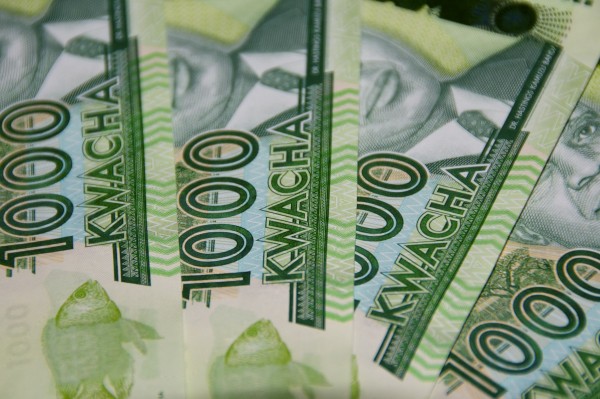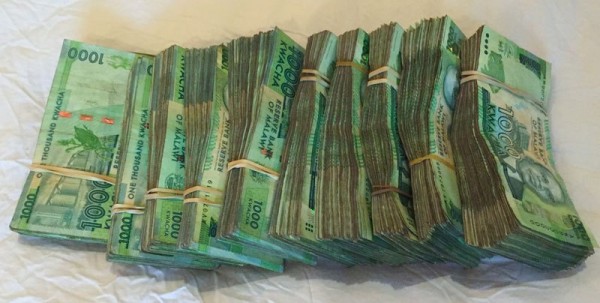![Kwacha depreciate]()
The advisory firm, Nico Assets Managers has said in its report that Malawi Kwacha has depreciated by 28.5 percent compared to a 14.5 annual depreciation rate recorded during the same period last year.
[caption id="attachment_99504" align="alignright" width="600"]
![Kwacha depreciate]()
Malawi Kwacha under severe pressure[/caption]
[caption id="attachment_99503" align="alignright" width="600"]
![When exchanging US Dollars for Malawi Kwachas (MK), bring a suitcase]()
When exchanging US Dollars for Malawi Kwachas (MK), bring a suitcase[/caption]
And the local unit will continue to depreciate as the lean season advances, the report said and in view of excess demand for dollars on the parallel market, according to foreign currency parallel market dealer.
According to Reserve Bank of Malawi (RBM), the Kwacha shed 2.3 percent against the dollar to trade at K615.79 as at December 3 2015 from a rate of K602.07 recorded on November 27 2015 in authorised dealer banks (ADBs).
The local unit has also sharply weakened against the British pound during the same period, to sell at K928.06 from K902.24.
The situation is also the same against the South Africa rand and euro, as the local unit has ceded 2.4 percent and 2.5 percent to trade at K43.13 from K42.14 and K654.52 from K638.79, respectively.
The loss in the kwacha value against major international trading currencies has mainly been attributed to a combination of a strengthening US dollar and speculation in the run up to the lean season. The situation has been worsened by low revenue from tobacco and lack of donor aid.
"The exchange rate is expected to continue depreciating in the short term as the lean season continues. This could be mitigated if the authorities sell forex to the private sector," suggests the advisory firm in the report.
Economic experts have projected that the fall of the kwacha will result into the rising price of goods and service. And this will put pressure of workers asking for higher wages leading to more dreaded demonstrations.

 Malawi Kwacha under severe pressure[/caption]
[caption id="attachment_99503" align="alignright" width="600"]
Malawi Kwacha under severe pressure[/caption]
[caption id="attachment_99503" align="alignright" width="600"] When exchanging US Dollars for Malawi Kwachas (MK), bring a suitcase[/caption]
And the local unit will continue to depreciate as the lean season advances, the report said and in view of excess demand for dollars on the parallel market, according to foreign currency parallel market dealer.
According to Reserve Bank of Malawi (RBM), the Kwacha shed 2.3 percent against the dollar to trade at K615.79 as at December 3 2015 from a rate of K602.07 recorded on November 27 2015 in authorised dealer banks (ADBs).
The local unit has also sharply weakened against the British pound during the same period, to sell at K928.06 from K902.24.
The situation is also the same against the South Africa rand and euro, as the local unit has ceded 2.4 percent and 2.5 percent to trade at K43.13 from K42.14 and K654.52 from K638.79, respectively.
The loss in the kwacha value against major international trading currencies has mainly been attributed to a combination of a strengthening US dollar and speculation in the run up to the lean season. The situation has been worsened by low revenue from tobacco and lack of donor aid.
"The exchange rate is expected to continue depreciating in the short term as the lean season continues. This could be mitigated if the authorities sell forex to the private sector," suggests the advisory firm in the report.
Economic experts have projected that the fall of the kwacha will result into the rising price of goods and service. And this will put pressure of workers asking for higher wages leading to more dreaded demonstrations.
When exchanging US Dollars for Malawi Kwachas (MK), bring a suitcase[/caption]
And the local unit will continue to depreciate as the lean season advances, the report said and in view of excess demand for dollars on the parallel market, according to foreign currency parallel market dealer.
According to Reserve Bank of Malawi (RBM), the Kwacha shed 2.3 percent against the dollar to trade at K615.79 as at December 3 2015 from a rate of K602.07 recorded on November 27 2015 in authorised dealer banks (ADBs).
The local unit has also sharply weakened against the British pound during the same period, to sell at K928.06 from K902.24.
The situation is also the same against the South Africa rand and euro, as the local unit has ceded 2.4 percent and 2.5 percent to trade at K43.13 from K42.14 and K654.52 from K638.79, respectively.
The loss in the kwacha value against major international trading currencies has mainly been attributed to a combination of a strengthening US dollar and speculation in the run up to the lean season. The situation has been worsened by low revenue from tobacco and lack of donor aid.
"The exchange rate is expected to continue depreciating in the short term as the lean season continues. This could be mitigated if the authorities sell forex to the private sector," suggests the advisory firm in the report.
Economic experts have projected that the fall of the kwacha will result into the rising price of goods and service. And this will put pressure of workers asking for higher wages leading to more dreaded demonstrations.